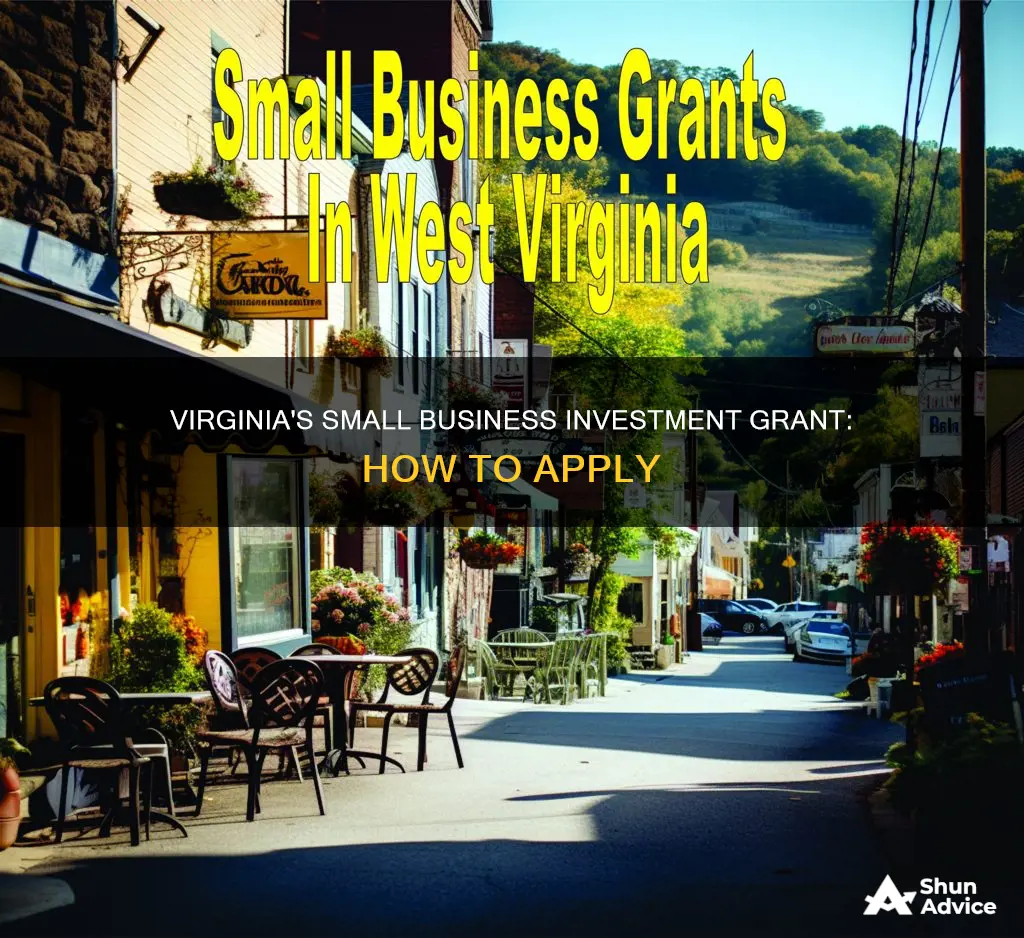
The Small Business Investment Grant Fund (SBIG) is a program that provides grants to investors who have invested in Virginia's eligible small businesses. The program is designed to encourage individuals or entities to make cash investments in small businesses for working capital, growth, and expansion. The grants are not given directly to the small businesses but are awarded to eligible investors who meet specific criteria. The SBIG program is currently closed for FY2024, but individuals can check the website for updates on the Small Business Grant Program for FY2025.
| Characteristics | Values |
|---|---|
| Name | Small Business Investment Grant Fund (SBIG) |
| Administered By | Virginia Small Business Financing Authority |
| Grant Recipient | Investors that have invested in Virginia's eligible small businesses |
| Grant Amount | Lesser of 25% of the qualified investment or $50,000 |
| Lifetime Maximum | $250,000 per investor |
| Annual Maximum | $250,000 per small business |
| Eligibility Requirements | Virginia small business eligibility requirements and Virginia investor eligibility requirements must be met |
| Application Period | July 15, 2020 – August 3, 2020 |
| Status | Closed for FY2024; updates expected for FY2025 |
What You'll Learn

Who is eligible for the SBIG program?
The Small Business Investment Grant Fund (SBIG) program provides a meaningful return on investment from the Commonwealth to encourage individuals or special purpose entities to make cash investments in Virginia's eligible small businesses. The SBIG grants are awarded and paid to eligible investors who have invested in these small businesses.
To be eligible for the SBIG program, investors must be individuals subject to Virginia income tax or special purpose entities established for the purpose of making investments for such individuals. Eligible investors cannot be individuals who engage in the business of making debt or equity investments in private businesses or any person who is a partner, shareholder, member, or owner of an entity that engages in such business. They must also not have been allowed a Virginia qualified equity and subordinated debt investment tax credit for investment in a small business.
Eligible small businesses must meet the following criteria:
- Be a corporation, pass-through entity, or other entity (sole proprietors are excluded)
- Have annual gross revenues of no more than $5 million in the most recent fiscal year
- Employ no more than 50 individuals in Virginia
- Be primarily engaged in business in Virginia or have substantially all of its production in the Commonwealth
- Have its principal office or facility in Virginia
- Not have obtained more than $5 million in aggregate gross cash proceeds from equity or debt investments (excluding commercial loans from financial institutions) during its existence
The SBIG program is currently closed for FY2024, but individuals and businesses can check the website for updates on the Small Business Grant Program for FY2025.
Mutual Funds: US Market Investment Options for Indians
You may want to see also

What are the grant amounts?
The Virginia Small Business Investment Grant Fund Program (SBIG) offers grants that are subject to fund availability and will be the lesser of 25% of the qualified investment or $50,000. There is a $250,000 lifetime maximum per investor and a $250,000 annual maximum per small business.
Eligible investments include cash investments in the form of equity or subordinated debt made into a qualified business on or after July 1, 2019, but before January 1, 2022. Equity investments must remain in place for a minimum of two years. If in the form of subordinated debt, the investment may not require repayment of the principal for the first three years after issuance, may not be guaranteed by any other person or secured by assets of the business or any person, and must be subordinated to all indebtedness of the qualified business to national or state-chartered banks.
Violations of the terms of a grant will result in the forfeiture of grant proceeds and the payment of interest.
Direct vs Regular Mutual Funds: Which is the Better Investment Option?
You may want to see also

What are the eligibility requirements for Virginia small businesses?
The Small Business Investment Grant Fund (SBIG) program is designed to encourage investment in Virginia's small businesses by investors. While SBIG grants are awarded to eligible investors, there are specific eligibility requirements that Virginia small businesses must meet for their investors to be considered for the grant.
To be eligible, a Virginia small business must meet all of the following criteria:
- Be a corporation, pass-through entity, or other entity (sole proprietors are excluded)
- Have annual gross revenues of no more than $5 million in its most recent fiscal year
- Have no more than 50 employees who are employed in Virginia
- Be engaged in business primarily in Virginia or have substantially all of its production in the Commonwealth
- Have its principal office or facility in Virginia
- Not have obtained during its existence more than $5 million in aggregate gross cash proceeds from the issuance of its equity or debt investments, excluding commercial loans from financial institutions
Additionally, eligible investors cannot be awarded a grant for an investment in a small business for which they have or will be allowed a Virginia qualified equity and subordinated debt investment tax credit.
It is important to note that the SBIG program is currently closed for FY2024, and interested parties are advised to check the Virginia Department of Small Business and Supplier Diversity's website for updates on the Small Business Grant Program for FY2025.
Gilt Funds: Worth Investing in Now?
You may want to see also

What are the eligibility requirements for Virginia investors?
The Small Business Investment Grant Fund (SBIG) program provides a meaningful return on investment to encourage individuals or special purpose entities to make cash investments in Virginia's eligible small businesses. While the SBIG program is closed for FY2024, here are the eligibility requirements for investors, as outlined by the Virginia Small Business Financing Authority:
Eligibility Requirements for Virginia Investors:
- Eligible investors must be individuals subject to Virginia income tax or special purpose entities established for making investments for such individuals.
- Investors cannot be individuals or entities that engage in the business of making debt or equity investments in private businesses. This includes partners, shareholders, members, or owners of such entities.
- Eligible investors cannot receive a grant for an investment in a small business if they have been or will be allowed a Virginia qualified equity and subordinated debt investment tax credit.
- Unlike the qualified equity and subordinated debt investment tax credit, the SBIG program does not appear to prohibit investors who hold an investment in the small business or those with a family member or any entity affiliated with the investor from receiving compensation from the small business in exchange for services provided within one year before or after the date of the investment.
- All grants are subject to fund availability and will be the lesser of 25% of the qualified investment or $50,000. There is a $250,000 lifetime maximum per investor and a $250,000 annual maximum per small business.
- Eligible investments include cash investments in the form of equity or subordinated debt made into a qualified business between July 1, 2019, and January 1, 2022. Equity investments must remain in place for at least two years.
- If the investment is subordinated debt, it may not require repayment of the principal for the first three years, cannot be guaranteed by any person or secured by business assets, and must be subordinated to all indebtedness of the qualified business to national or state-chartered banks.
Index Funds: Halal or Haram?
You may want to see also

How do I apply for the SBIG program?
The SBIG program is currently closed for FY2024. Please continue to check the Virginia Small Business Financing Authority website for updates on the Small Business Grant Program for FY2025.
To apply for the SBIG program, you must meet the eligibility criteria for either a Virginia small business or an investor.
Virginia Small Business Eligibility Requirements:
To be considered investor-grant eligible, a business must meet all of the following criteria:
- Be a corporation, pass-through entity, or other entity (sole proprietors are excluded)
- Have annual gross revenues of no more than $5 million in its most recent fiscal year
- Have no more than 50 employees who are employed in Virginia
- Be engaged in business primarily in Virginia or have substantially all of its production in the Commonwealth
- Have its principal office or facility in Virginia
- May not have obtained during its existence more than $5 million in aggregate gross cash proceeds from the issuance of its equity or debt investments, excluding commercial loans from financial institutions
Virginia Investor Eligibility Requirements:
Eligible investors must meet the following criteria:
- Be an individual subject to Virginia income tax or a special purpose entity established for making investments for such an individual
- May not be an individual who engages in the business of making debt or equity investments in private businesses, or any person who is a partner, shareholder, member, or owner of an entity that engages in such business
- May not be awarded a grant for an investment in a small business for which the investor has or will be allowed a Virginia qualified equity and subordinated debt investment tax credit
Eligible Investments:
Eligible investments include:
- A cash investment in a qualified business in the form of equity or subordinated debt, made into a qualified business on or after July 1, 2019, but before January 1, 2022. Equity investments must remain in place for a minimum of two years.
- If subordinated debt, the investment may not require repayment of the principal for the first three years after issuance, may not be guaranteed by any person or secured by assets, and must be subordinated to all indebtedness of the qualified business to national or state-chartered banks
Application Process:
Both the small business and the investor must submit an application and meet the criteria. The grants are paid to investors, not the small business. Applications are reviewed on a first-come, first-served basis.
Maximizing HSA Investment: Fidelity's Smart Strategies for Tax-Free Growth
You may want to see also
Frequently asked questions
The Small Business Investment Grant Fund (SBIG) is a program that provides a meaningful return on investment from the Commonwealth to encourage individuals or special purpose entities to make cash investments in Virginia's eligible small businesses for working capital, growth, and expansion.
To be eligible for the SBIG program, businesses must meet the following criteria:
- Be a corporation, pass-through entity, or other entity (sole proprietors are not eligible).
- Have annual gross revenues of no more than $5 million in the most recent fiscal year.
- Have no more than 50 employees who are employed in Virginia.
- Be engaged in business primarily in Virginia or have substantially all of its production in the Commonwealth.
- Have its principal office or facility in the Commonwealth.
- Not have obtained more than $5 million in aggregate gross cash proceeds from equity or debt investments during its existence, excluding commercial loans from financial institutions.
Eligible investors must be individuals subject to Virginia income tax or special purpose entities established for making investments for such individuals. They cannot be individuals or entities engaged in the business of making debt or equity investments in private businesses.
All grants are subject to fund availability and will be the lesser of 25% of the qualified investment or $50,000. There is a $250,000 lifetime maximum per investor and a $250,000 annual maximum per small business.
Eligible investments include cash investments in the form of equity or subordinated debt made into a qualified business on or after July 1, 2019, but before January 1, 2022. Equity investments must remain in place for at least two years. Subordinated debt investments may not require principal repayment for the first three years and must be subordinated to all indebtedness of the qualified business to national or state-chartered banks.
Both the small business and the investor must submit an application and meet the eligibility criteria. The SBIG program is currently closed for FY2024, but interested applicants can check the website for updates on the Small Business Grant Program for FY2025.







